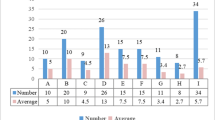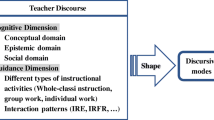Abstract
Enactment of scientific inquiry in classroom has attracted a great attention of science educators around the world. In this study, we examined two competent teachers’ (one Grade 9 chemistry teacher and one Grade 4 science teacher) enactment of scientific inquiry in selected teaching units to reveal the characteristics of enacted inquiry at different grade levels by analyzing lesson sequence videos. The coding schemes for enacted inquiry consist of ontological properties and instructional practices. Pre-topic and post-topic teacher interviews and the two teachers’ responses to a questionnaire were adopted to identify the factors influencing teacher’s enactment. The results indicate that the two case teachers’ enactment involved a range of inquiry activities. The enacted inquiry at fourth-grade level covered all the inquiry elements, tending to engage students in the whole procedure of inquiry. The ninth-grade chemistry class placed emphasis on the elements “making plans” to solve problems in authentic context. Important factors influencing the enactment include teacher’s understanding about scientific inquiry, textbooks, assessment, students and resource. Implications for inquiry enactment and instruction improvement have been provided.



Similar content being viewed by others
References
Arizona State University (2008) Discourse in Inquiry Science Classrooms (DiISC): Reference Manual. Retrieved from http://digitalcommons.unl.edu/teachlearnfacpub/121/
Banchi H, Bell R (2008) The many levels of inquiry. The Learning Centre of the NSTA. Retrieved from http://learningcenter.nsta.org/files/sc0810_26.pdf
Breslyn W, McGinnis JR (2012) A comparison of exemplary biology, chemistry, earth science, and physics teachers’ conceptions and enactment of inquiry. Sci Educ 96:48–77
Chinese Ministry of Education (2001a) National curriculum standards series: science curriculum standards for grade 3–6. Beijing Normal University Press, Beijing (in Chinese)
Chinese Ministry of Education (2001b) National chemistry curriculum standard for junior high school. Beijing Normal University Press, Beijing (in Chinese)
Crawford BA (2007) Learning to teach science as inquiry in the rough and tumble of practice. J Res Sci Teach 44(4):613–642
Eltinge EM, Roberts CW (1993) Linguistic content analysis: a method to measure science as inquiry in textbooks. J Res Sci Teach 30(1):65–83
Forbes CT, Davis EA (2010) Curriculum design for inquiry: preservice elementary teachers’ mobilization and adaptation of science curriculum materials. J Res Sci Teach 47(7):820–839
Ford MJ, Wargo BM (2007) Routines, roles, and responsibilities for aligning scientific and classroom practices. Sci Educ 91:133–157
Fu L, Zhou S, Zheng C (2007) Investigating the frequencies and time length of inquiry activities. Chem Educ 11:42–44 (in Chinese)
Gerrnann PJ, Haskins S, Auk S (1996) Analysis of nine high school biology laboratory manuals: promoting scientific inquiry. J Res Sci Teach 33(5):475–499
Hasson E, Yarden A (2012) Separating the research question from the laboratory techniques: advancing high-school biology teachers’ ability to ask research questions. J Res Sci Teach 49(10):1296–1320
Liu X, Liang L, Liu E (2012) Science education research in china: challenges and promises. Int J Sci Educ 34(13):1961–1970
Mcdonald S, Songer NB (2008) Enacting classroom inquiry: theorizing teachers’ conceptions of science teaching. Sci Educ 92:973–993
National Research Council (1996) National science education standards. National Academy Press, Washington, DC
Schneider RM, Krajcik J, Blumenfeld P (2005) Enacting reform-based science materials: the range of teacher enactments in reform classrooms. J Res Sci Teach 42(3):283–312
Schwab JJ (1962) The teaching of science as enquiry. In: Schwab JJ, Brandwein PF (eds) The teaching of science. Harvard University Press, Cambridge
Wang L (2010a) Progress and reflection on chemistry curriculum reform (part 1). Chem Educ 4:15–21 (in Chinese)
Wang L (2010b) Progress and reflection on chemistry curriculum reform (part 2). Chem Educ 5:20–24 (in Chinese)
Wu H, Krajcik JS (2006) Inscriptional practices in two inquiry-based classrooms: a case study of seventh graders’ use of data tables and graphs. J Res Sci Teach 43(1):63–95
Zhou S, Li T, Zheng C (2005) Interpretation on the teaching activities of scientific inquiry in the context of new curriculum. Teach Educ Res 07:65–69 (in Chinese)
Author information
Authors and Affiliations
Corresponding author
Appendix: Interview Protocols and Questionnaire
Appendix: Interview Protocols and Questionnaire
-
(a)
Pre-topic Interview Protocol
-
1.
Tell me something about the topic.
-
2.
How do you decide what to teach?
-
3.
Which resources, such as documents or Web sites, did you refer to in planning this topic?
-
4.
What are your main objectives in teaching this topic? What do you hope that your students will learn about this topic?
-
5.
How do you decide how to teach the topic? What activities have you chosen for the teaching of this topic?
-
6.
What do you think are the challenges for the students to learn about this topic?
-
1.
-
(b)
Post-topic Interview Protocol
-
1.
To what extent have you achieved your instructional goals for this unit?
-
2.
How did you know how well you have achieved your instructional goals for this unit?
-
3.
To what extent did assessments of any type influence the planning and the teaching of this unit? And how does it affect any other aspects of teaching beside this topic?
-
4.
What were the key decisions you made during the teaching of this unit?
-
1.
-
(c)
The Teacher Questionnaire for Each Lesson
-
1.
Please describe the subject content of today’s lesson.
-
2.
What was the main thing you wanted students to learn from today’s lesson? Why do you think it is important for students to learn this?
-
3.
To what extent did the students meet your learning goals? How do you know?
-
4.
Please describe what did not go according to your plan.
-
1.
Rights and permissions
About this article
Cite this article
Wang, L., Zhang, R., Clarke, D. et al. Enactment of Scientific Inquiry: Observation of Two Cases at Different Grade Levels in China Mainland. J Sci Educ Technol 23, 280–297 (2014). https://doi.org/10.1007/s10956-013-9486-0
Published:
Issue Date:
DOI: https://doi.org/10.1007/s10956-013-9486-0




